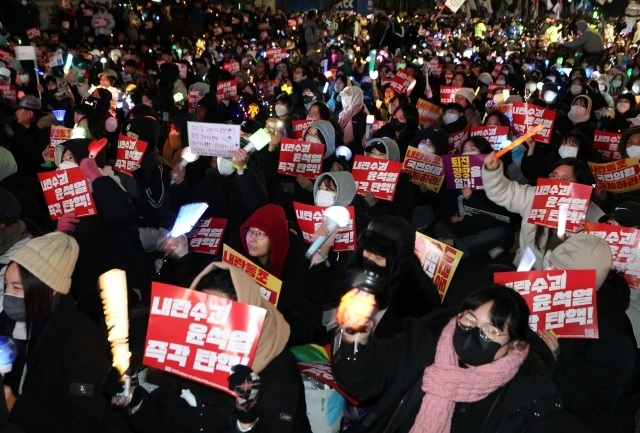 |
Protesters holding banners and light sticks call for President Yoon Suk Yeol's impeachment and arrest in front of the National Assembly in Seoul on Monday. (Yonhap) |
South Korea’s judiciary on Friday criticized the revelation that a sitting judge was reportedly included on a list of individuals whose location was to be tracked for potential arrest during martial law operations on Dec. 3.
Describing it as a "serious violation of judicial independence," both the Supreme Court and the Seoul Central District Court issued statements Friday condemning the action as a threat to the rule of law.
A local media outlet, the JoongAng Ilbo, reported Friday morning that Seoul Central District Court Judge Kim Dong-hyun -- who had recently acquitted main opposition Democratic Party of Korea Chair Rep. Lee Jae-myung in a perjury trial -- was included on the list of individuals targeted during martial law.
Cho Ji-ho, commissioner general of the National Police Agency, reportedly told investigators that he received a call from Counterintelligence Commander Lt. Gen. Yeo In-hyung around 10:30 p.m. on Dec. 3, shortly after the declaration of martial law, requesting the tracking of prominent individuals. According to Cho, the list included Judge Kim. This is the first revelation that a judge was among the targets for location tracking and potential arrest.
Among the names on the 15-person list disclosed previously were ruling People Power Party Chair Han Dong-hoon; main opposition leader Lee Jae-myung; Democratic Party of Korea Floor Leader Park Chan-dae; minor opposition Rebuilding Korea Party Chair Rep. Cho Kuk, Democratic Party Reps. Jung Chung-rae and Kim Min-seok; National Assembly Speaker Woo Won-shik; former Supreme Court Chief Justice Kim Myeong-soo; former National Election Commission Chairperson Kwon Soon-il; liberal journalist Kim Ou-joon; and left-leaning activist Kim Min-woong.
In response to the media report, the Supreme Court issued a statement saying: "If these allegations are true, this constitutes a direct and grave infringement on judicial authority. Such actions deeply undermine the principle of judicial independence, jeopardizing the foundations of a nation governed by the rule of law. The judiciary demands a prompt investigation to uncover the full truth and hold those responsible to account."
The Seoul Central District Court also issued a statement: "If the allegations are true, this would represent a serious infringement on judicial independence, driven solely by dissatisfaction with a specific court ruling. Such actions constitute a grave violation of the rule of law and the constitutional principle of separation of powers. We express our deep regret over this matter."